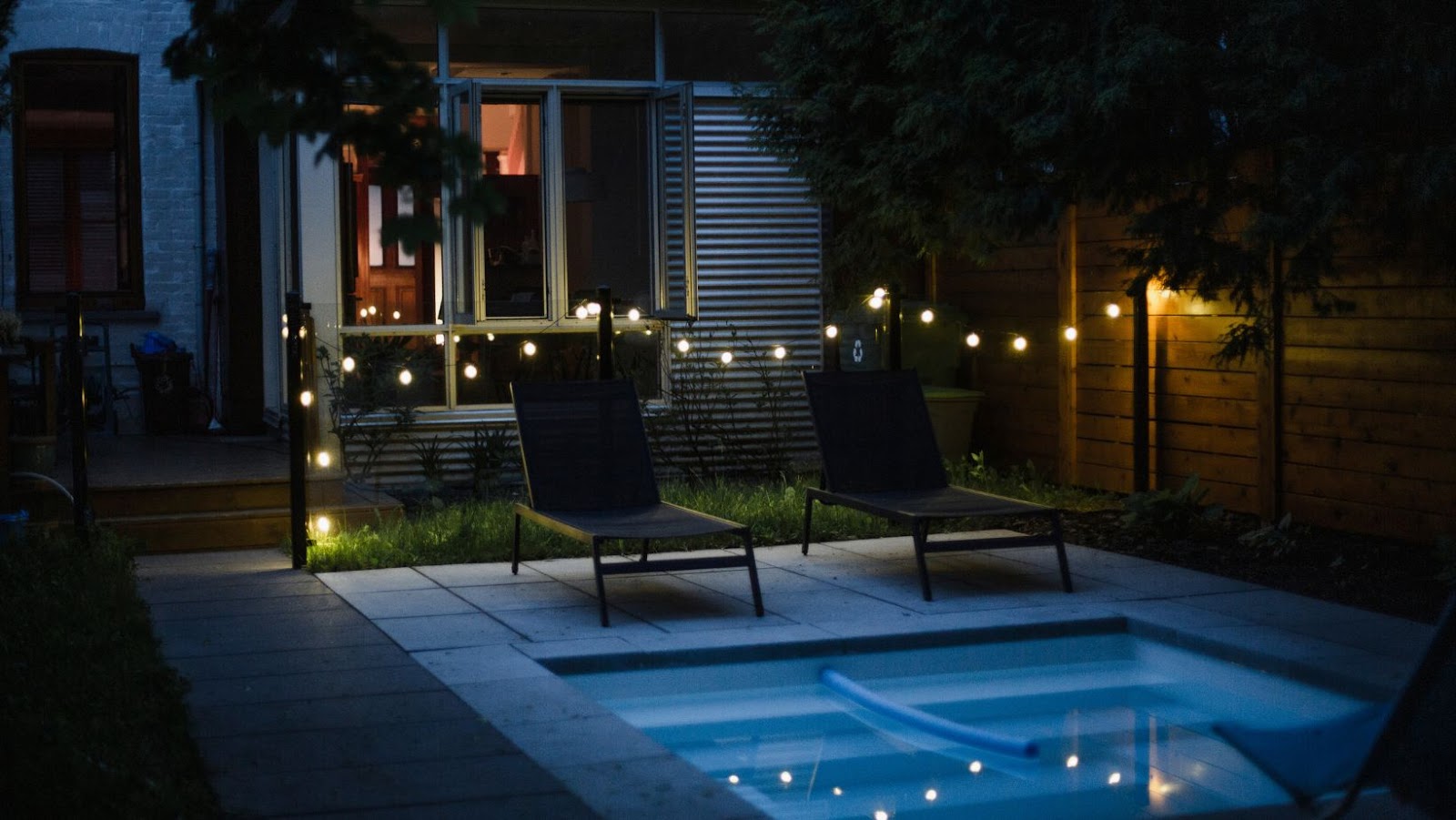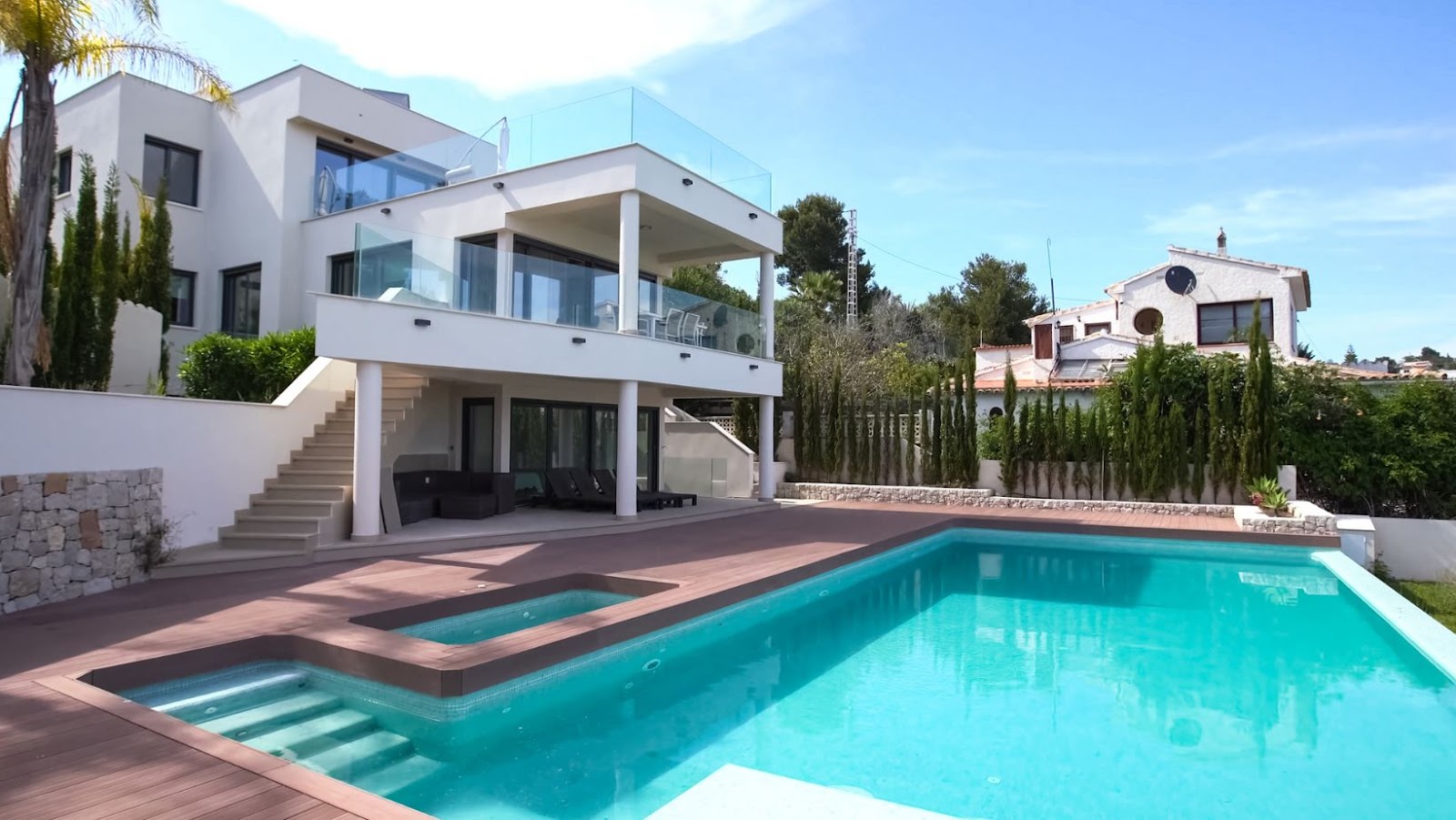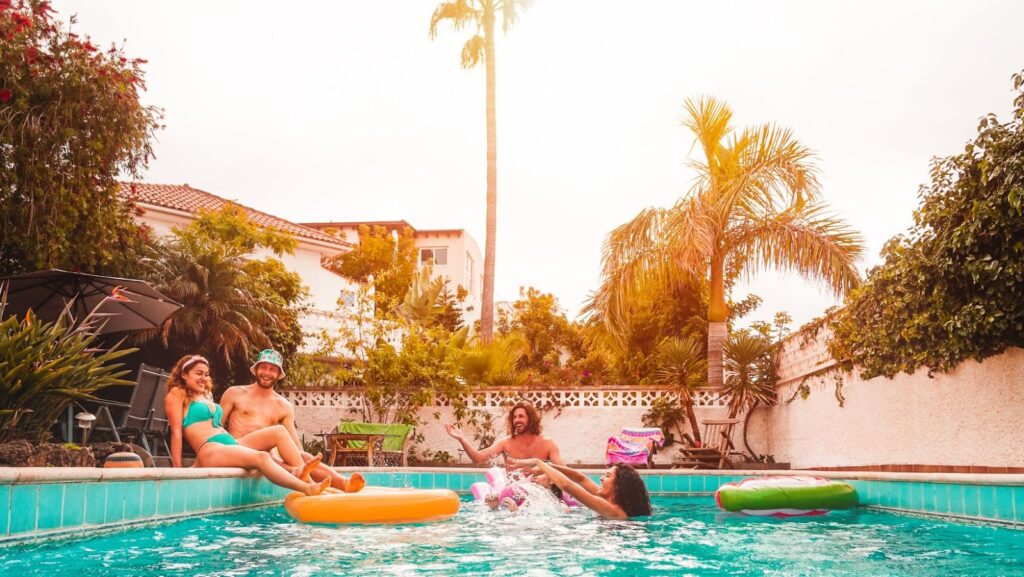Having a pool in a small backyard can be a great way to enjoy the outdoors and make the most of your space. Swimming pools are not only fun but also offer numerous health benefits. They can act as an escape from the stress of everyday life and provide an excellent source of exercise. Not to mention, pools add beauty and value to any home.
However, there are many factors to consider when deciding whether or not having a pool in your small backyard is right for you. This guide will discuss the pros and cons, costs associated with installation and maintenance, safety tips for families with young children, and other considerations related to having a pool in your small backyard. By the end of this article, you’ll have a better understanding of all aspects involved in designing an outdoor space with a swimming pool that fits your family’s needs and budget.
How to have a pool in a small backyard
Having a pool in a small backyard can be a great way to enjoy some quality time with your family and friends. Not only can it provide hours of fun in the sun, but it can also give you some great exercise options, provide a place to cool down on hot days, and even add value to your home. Despite the challenge of limited space, there is still a way to make it work with thoughtful design and planning. Let’s dive into the details of how to make it all happen.
Increased Property Value
Having a pool in your small backyard is a great way to increase the value of your property. According to the National Association of Realtors (NAR), the addition of a pool in your backyard can add up to 8 percent to its total resale value. This can be especially beneficial if you plan on selling your home sometime in the future.
Additionally, buyers often view a home with a pool as desirable, as it can give them an easy way of entertaining friends and family or just kicking back at the end of their day needing some relaxation or fun with immediate access to their own private outdoor oasis. Even if potential buyers don’t intend on using it themselves, they may be more inclined to make an offer if they know they could potentially increase their home’s resale value if they choose to install one later down the road.

Health Benefits
Having a pool in your small backyard can provide more than just visual appeal and entertainment – it can have many health, physical and psychological benefits as well.
Physically, swimming is an excellent form of exercise as it works all major muscle groups without putting excess strain on the body. Whether you swim for lap time or for leisurely fun, the resistance of water helps to expand muscles, tone your physique and strengthen the cardiovascular system. This resistance also works wonders for joint mobility and injury prevention, which makes it suitable for individuals of all ages.
Mental health is also impacted by having a pool in a small backyard. Swimming has been known to help reduce stress while boosting self-esteem and providing a sense of accomplishment with each kind lap. If you’re looking to increase social opportunities in your life, a pool can help to bring friends together during barbeques or family gatherings as people come together to enjoy the sun-soaked days that summer brings. Additionally, spending time outside has been linked to improving concentration levels over time due its calming effects – perfect if you are looking to boost productivity at home!
Increased Socialization
Having a pool in a small backyard makes it easier to socialize with others on hot summer days. An inviting pool can be the perfect spot for hosting friends, family, and neighbors – a great way to extend hospitality while providing much-needed relief from the heat. Plus, having a fun and relaxing place to spend time outdoors creates opportunities for people to gather, play games together, and make memories. Whether it’s an impromptu gathering or an organized event, having a pool helps keep everyone cool while providing entertainment.
A swimming pool also provides an excellent way for children of all ages to stay healthy by getting plenty of exercise with stimulating aquatic activities like water volleyball and basketball. Plus, kids can explore different strokes and techniques that help strengthen breathing muscles and improve coordination as well as giving them something interesting to talk about when visiting with friends!
Friends can hang out in the pool late at night when the air starts cooling down, creating a pleasant atmosphere for conversations about shared experiences or new ideas. Swimming pools also encourage healthy competition among children during “deep end races” or diving contests that bring out the best in each individual while teaching useful lessons in perseverance and sportsmanship.
In addition to all these benefits, investing in a small backyard swimming pool is always cheaper than opting for larger pools – making it an attainable goal even for those who are on tight budgets!
Types of Pools for Small Backyards
Having a pool in a small backyard can be a great way to enjoy the summer without having to travel too far. There are a variety of types of pools that are more suitable for smaller backyards, such as inflatable pools, above-ground pools, and even above-ground plunge pools.
Let’s take a look at what these types of pools have to offer, and how you can make the most of having a pool in your small backyard:
Above-Ground Pools
Above-ground pools are a great option for smaller backyards. They require little space and can be set up and taken down with relative ease. Above-ground options range from metal shallow frames that sit on top of the ground to semi-permanent structures fit with filters and other technology. Many people opt for the metal framed options because they cost less, set up quickly, and can be taken down in the colder months to save space in their yard. These are typically installed above ground level but may also be partially or completely sunken into the ground if desired.
The other common type of above-ground pool is what is called a “pool kit” – which usually entails a larger, more expensive structure that’s usually made out of molded pieces of plastic or metal and fit with a filtration system, pumps, lighting systems, heating systems, ladders and diving boards. Pool kits come preassembled in many sizes to suit all yards. They are durable and designed to last many years; they also lend deeper depths compared to simpler above-ground pools which often have only shallow depths.
No matter which type of above-ground pool you choose for your small backyard oasis, remember that regular maintenance tasks such as testing chemical levels are essential for keeping your pool clean and enjoyable for swimming season after season!

In-Ground Pools
In-ground pools are a classic option that many homeowners opt for to maximize their backyard. Depending on the size of your lot, you can choose between an in-ground shape such as a rectangle, oval, or round. There are two materials often used to construct in-ground pools: fiberglass and concrete.
- Fiberglass pools require less maintenance than concrete, tend to be quicker and easier to install, and come prefabricated in pre-set sizes and shapes.
- Concrete pools offer the highest degree of customization since it is molded into whatever size or shape you desire at the site level. Though more expensive at first, long-term concrete pool maintenance costs will be significantly lower than those of fiberglass because time and money are spent on fewer repairs.
In addition, an in-ground option allows for aesthetic features such as paved deckspace and landscaping that add additional appeal and value to your small backyard. Lastly, these types of pool typically have larger depths thus providing a greater degree of comfort for swimming laps or diving into the deep end with family members or friends.
Cost Considerations
Having a pool in a small backyard is a great way to upgrade your outdoor living space and create a haven of relaxation. However, it’s important to consider the cost implications of such an undertaking.
The cost of a pool will depend on:
- the size of the pool
- the type of material used
- the additional features you may want for it
- the contractor you hire to install it.
It is essential to thoroughly research these factors before you make a decision.
Initial Costs
When you’re dreaming of having a pool in your small backyard, it’s important to take into account the initial cost of installation. The size and layout of your backyard, as well as the type and size of the pool, will affect how much you’ll need to spend.
On average, an above-ground pool can cost between $2,000 to $5,000 depending on its size and features. An inground pool usually costs between $15,000 and $45,000 for the complete installation. Consider features such as a heating system, safety guardrails and lighting that could add extra costs to your initial installation budget.
You may also want to talk to a contractor about ways you can install a large-sized pool in a small space by utilizing extra landscaping or cleverly designed spaces on your property. If you have an increase budget for an inground version compared to an above-ground option you may find more interesting shapes are available for further customization at this price point.
Ongoing Maintenance Costs
Before you decide to install a pool in your small backyard, it is important to consider the ongoing costs of proper maintenance. Pools require regular maintenance and upkeep in order to remain safe, clean and usable.
Maintenance expenses can include:
- Regular cleaning and filtering of the pool water
- Adding chemicals such as chlorine and algaecide
- Replacing worn parts such as pumps, filters, etc.
- Periodic draining or filling of the pool
- Hiring a professional cleaner or maintenance service
In addition to these regular costs, repairing existing problems or adding new features may also become necessary over time. It is important to research the necessary equipment which will be needed for your specific pool so that you can factor in related expenses into your budget. Planning ahead for these potential expenses will help ensure that your new backyard oasis remains an enjoyable addition to your home for many years.
Safety Considerations
When it comes to installing a pool in a small backyard, safety should be your number one priority. Having a pool in a small space brings with it certain safety considerations. It is important to be aware of the potential hazards of having a pool in a small backyard, and be sure to take the necessary steps to protect yourself, your family, and your property.
From understanding the law on pool fencing and learning the best safety practices, let’s discuss the safety considerations you should be aware of when having a pool in a small backyard:
Fencing Requirements
Fences make your backyard pool area safer and help protect against accidental drowning. To best protect your pool area, it is important to research local fence regulations that are in effect. Generally, regulations specify height requirements, holes within the fence must be of a certain size, and gates must also meet specified requirements to ensure children cannot get through them.
It is important to emphasize that whatever construction is done around your pool needs to be done with safety as the highest priority. Installing a large gate with self-closing mechanisms can prevent children entering the area without supervision. Many cities require any open body of water more than 18 inches deep have fencing including self-latching gates installed at least 48 inches above ground level and no spaces wider than 4 inches between vertical pickets.
It is recommended that all secure fencing continue around the entire perimeter of the pool, so that access from one side or another isn’t feasible for young children or pets; this will create a safe environment for loved ones and help prevent tragic accidents from occurring. It is also advisable to double check with city regulations throughout the process; this will ensure that you are following applicable laws as well as taking precautions so no loved one encounters danger while near your small backyard pool area.
Pool Covers
Pool covers are an essential safety precaution for any pool, no matter the size, as they prevent children and animals from accidentally entering the water. Additionally, a pool cover can reduce evaporation and keep leaves, dirt, and other debris from getting into your pool.
Pool covers come in two different types: manual and automatic.
- Manual covers allow you to physically lay the cover over the top of your pool when it is not in use by simply unrolling it onto the surface. These are ideal if you use your pool infrequently and don’t want to invest in an expensive automatic system.
- Automatic pool covers are motorized systems that can be used with either an electric or gas powered motor. By pressing a button, these systems will retract the cover over your swimming pool when it is not being used providing added levels of safety than manual covers do. Automatic covers also cut down on the time needed to open or close the cover significantly while keeping costs low as they are powered via battery rather than electricity or gas.
No matter which type of system you decide to use for covering your backyard pool, these two options can both provide peace of mind when used properly by preventing accidents from occurring whenever young children or animals may be in proximity to exposed water such as pools or hot tubs. Additionally, these systems will help protect against damage caused by water evaporation as well as debris like leaves and insects entering your swimming area which can save you money when maintaining your backyard oasis.
Pool Alarms
Pool alarms are an important safety consideration for any pool, particularly for those located in small backyards. They are designed to provide audible alerts, warning that uninvited guests may have gained access to the pool area. Pool alarms can be installed directly on their fences or on the waterline at poolside. By detecting movement within the perimeter these alarms provide a layer of security, alerting homeowners if unwanted intruders are near the pool area.
A few different types of pool alarms are available on the market today; motion sensors, float switches and pressure sensitive mats are among the most popular:
- Motion sensors use infrared technology to detect movement in a designated area and send an alert if anything moves within its range.
- Float switches typically attach to a life ring or buoy and come with a sensor which is placed in the water line at poolside; this will trigger an alarm if the level drops below a certain point due to splashing or draining of water.
- Pressure sensitive mats can be placed around any pool edge and will send an alert sound when someone steps onto them – ensuring that no one enters or leaves without being noticed!
Conclusion
Ultimately, the decision to add a pool to a small backyard should be weighed carefully. The best option may be to choose a low-maintenance, cost-effective solution such as an above-ground pool or hot tub which can bring the same enjoyment and relaxation that larger pools provide.
When it comes to the size and type of pool, careful consideration must be given to budget, maintenance requirements and current space limitations. By answering these questions honestly, homeowners will ensure they find the perfect pool for their small backyard that both suits their needs and won’t break the bank.


More Stories
What Are the Pros and Cons of Using Metal Furniture in Cafes?
Home Care Agency Services: Beyond Personal Care
Add Some Personality into Your Home with Creative Designs